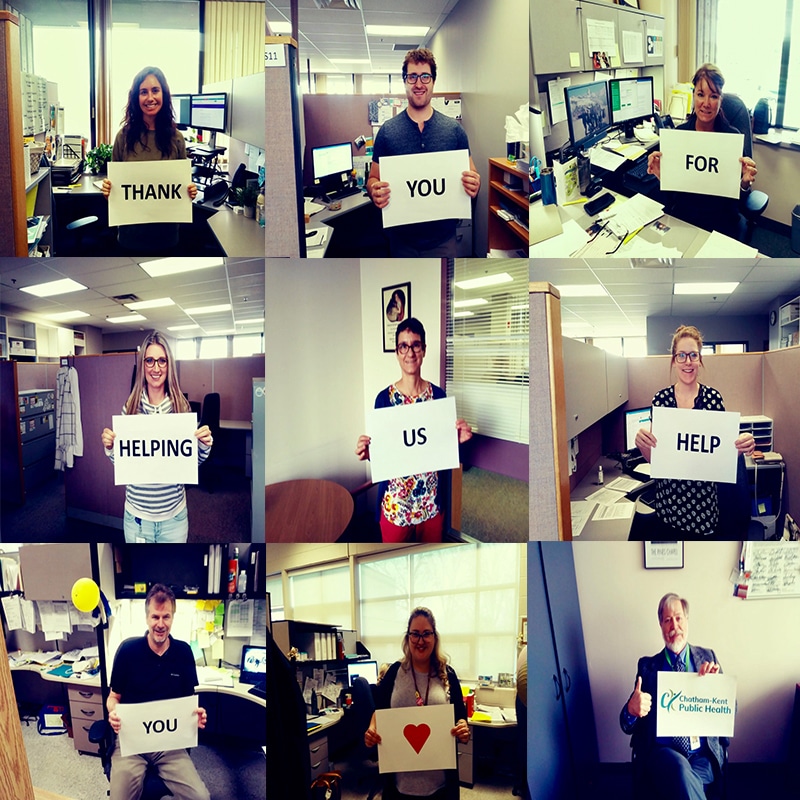We’ve been hearing and seeing community members asking about what we do after someone in Chatham-Kent has tested positive for COVID-19. We actually have a team dedicated to keeping our community safe from infections that can spread through the community, including COVID-19. We thought we’d share a peak behind the scenes to show the work of the ‘Infectious Disease’ team at CK Public Health.
Our work starts when someone is tested.
After collecting a sample to test for COVID-19, the healthcare provider sends the sample to the lab for analysis. The health care provider tells the person being tested to self-isolate while they wait for the test result. This is important to prevent the spread of the virus, which usually spreads through close person-to-person contact with someone who has it.
CK Public Health is notified when each sample is sent to the lab for testing. We monitor this and other information we receive (i.e. number of confirmed cases, confirmed cases in neighbouring regions, and number of tests done and waiting for results) so that we can identify trends and make informed decisions about the public health measures we take. We also share information with the public about the confirmed cases and tests that have been done Monday-Friday on our website.
With a huge demand for COVID-19 testing across the province, test results take several days to process. We contact everyone who gets tested with their test result, whether positive or negative, as soon as possible.
“We have your test results…” What happens when someone has tested positive for COVID-19?
After we learn that someone has tested positive for COVID-19, we contact them as soon as possible to:
- share the test results,
- help them get care they may need,
- provide information about what they should do, and
- answer any questions they have.
Then, we start to work on contact tracing, the process of gathering information about everyone the person with the virus had contact with during the time the virus could be passed on to others.
Contact tracing is a very important part of our daily work at CK Public Health and is something we have been doing long before the COVID-19 pandemic. For example, we do contact tracing for sexually transmitted infections and for disease outbreaks in long-term care homes. In fact, we have a team dedicated to keeping our community safe from infectious and communicable diseases, including COVID-19. Even though we continue to learn new things about the COVID-19 virus, the process we use to contain the spread of the virus is the same.
Contact tracing involves these key steps:
We identify people who may have been exposed.
We identify the people (contacts) who have been in close contact with the person who tested positive. We do an in-depth interview to make sure that all possible contacts are considered. We ask about who the person who has the virus may have been around for a specific time-period before they were showing symptoms. For many people, these contacts include family members, co-workers, friends, and health care providers.
We reach out to people who may have been exposed.
We then inform all people (contacts) who were identified in the interview as soon as possible. We do an assessment for symptoms of COVID-19 with the people who could have been exposed, and provide health teaching to prevent the spread of the infection. The instructions will vary depending on each situation. Our advice is based on the most current information from the Ontario Ministry of Health and guidance from Dr. Colby, our Medical Officer of Health.
We follow-up and monitor.
Our job doesn’t stop there. We continue to connect with people who have tested positive and others who may have been exposed to the virus to monitor for signs and symptoms of infection, answer questions, and address any new concerns.
What do we tell people who have COVID-19?
At this time, there is no treatment for COVID-19. Because of this, we tell most people who become infected and whose symptoms are mild to manage them at home. For example, people who can breathe reasonably well outside of coughing spells, are able to drink liquids, are urinating a normal number of times a day, and who are able to move about their home reasonably well do not need to go to an emergency room. We also tell anyone who tests positive:
- to self-isolate to prevent the spread of the infection;
- complications are most likely in older adults and those with other chronic health conditions;
- if people do experience severe symptoms like chest pains or feel they’re not able to get enough air, they should call 9-1-1 or go to the emergency department.
CK Public Health is working hard to keep everyone in the community safe during this time. Contact tracing is one piece of the puzzle to prevent the spread of COVID-19.
You play a key part in preventing the spread of COVID-19!
While it may not seem like much, your efforts to stop the spread of COVID-19 are essential. You help stop the spread when you:
- wash your hands frequently;
- cover your cough or sneeze with a tissue or your elbow;
- avoid touching your face with unwashed hands;
- disinfect frequently touched surfaces;
- practice physical distancing & self-isolate when you should;
- share facts from good sources of information (like CK Public Health, the Governments of Ontario and Canada);
- help friends, family and neighbours who are at higher risk of complications from COVID-19 (i.e. people who are 70 years or older or who have compromised immune system).
Learn more about how you can help stop the spread!

